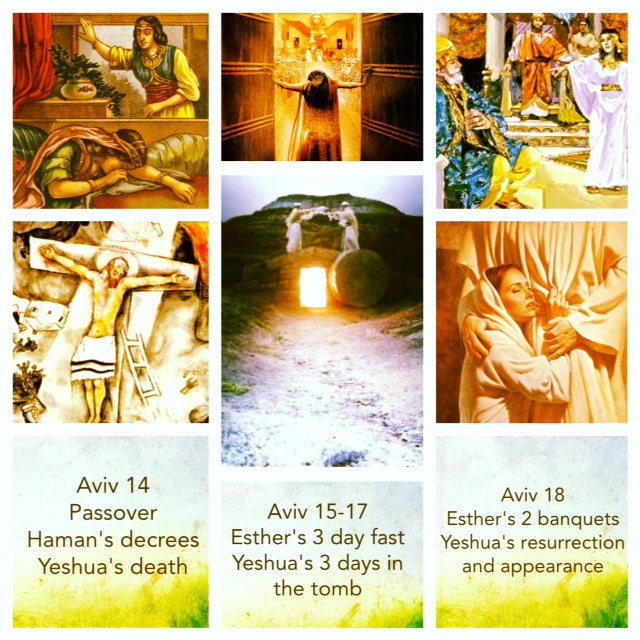Timing is Everything with God
What does the death burial and resurrection of Messiah Yeshua have to do with the dramatic events in the life of Queen Esther of Persia? Much in every way. The first century passion of Messiah was accomplished on the very anniversary days of the fasting and royal banquets of Queen Esther. The days of Passover, Unleavened Bread, and First Fruits were all unfolding, during both of the dramatic life and death events, in Esther’s and Yeshua’s lives. Coincidence? Not with God.
Psalm 22 is a Jewish song for the Purim holiday. It is also a Christian Psalm that is referred to at Easter time to speak of the horrors of the crucifixion. What does Psalm 22 have to do with both Queen Esther and Messiah Yeshua? According to Jewish understanding about Psalm 22, King David was speaking prophetically of Esther’s anguish of soul, and the deliverance of the Jewish people. According to Christian understanding in Psalm 22, King David was speaking prophetically about the death of Messiah. Can they both views be correct? Yes, Psalm 22 is about Esther and about Yeshua! Because King David saw in the prophetic future, both sets of the dramatic events that would foreshadow the coming of Messiah. God keeps His calendar appointments, to the day, and to the hour.
We, as Messianic Believers, have the privilege of seeing through both the lenses of Judaism and Christianity, and see an entirely different paradigm than most Christians or Jews perceive. If you consider the Jewish lens, or understanding of Scripture to be the color blue, and the Christian lens to be red, each one is unique, and entirely different from the other. Looking through glasses with the color lens of your paradigm dictates what your perception. When you layer one lens on top of the other, the two together, one can now see through purple lenses, and given the view point of royal perspective. That is the privilege we share of being called into the Kingdom, for such as time as this.
In the year of Yeshua’s death and resurrection, 30 A.D., the day of Passover, Aviv [Nisan] 14th, was the fourth day of the week, a Wednesday. The day of Aviv 10th in that year, a day traditionally known by Christians as Palm Sunday, was on the weekly Sabbath, a Saturday (Palm Sabbath). Four days after the Lamb of God was taken and examined in the Temple, He was labeled with the title, “The King of the Jews”, and hung upon the cross. Messiah Yeshua was lifted up on the tree on the fourth day of the week. Counting that day, and the three days in nights He was in the tomb, brings us to Aviv 18, four days later.
The number four has to do with authority. On day four of creation, the sun, moon, and stars were created, to rule the earth. The lights in the heavens govern our calendar, by determining the Feasts of the LORD. “And God said, Let there be lights in the firmament of the heaven to divide the day from the night; and let them be for signs, and for seasons [moedim – feasts], and for days, and years” (Genesis 1:14).
In 30 A.D. Yeshua gave up His authority, and died on the fourth day, at the time the Temple Passover lambs were slaughtered, the ninth hour. He was placed in the tomb for three nights and three days. At the end of the weekly Sabbath, at the time of Havdalah, Messiah Yeshua was resurrected from the tomb, defeating the power of death. The timing of this was at the beginning (the evening) of the Biblical holiday of First Fruits. His resurrection destroyed the power of the Enemy, and made a public spectacle of Satan. “Knowing that Messiah being raised from the dead dieth no more; death hath no more dominion over Him” (Romans 6:9) “And having spoiled principalities and powers, He made a shew of them openly, triumphing over them in it.” (Col. 2:15)
Centuries prior, during this same days on the Biblical calendar, Queen Esther and her people, also “died” to themselves in fasting and prayer. At the end of those three days and nights, at the time of Havdalah, Esther entered the King’s chamber, unannounced, and invited the King to the first of two banquets. She risked her life to save her people from perishing. This was also the eve of First Fruits.
At the first banquet, Esther did not tell the King her reason for her bursting forth into his throne room, but instead, invited the king to a second banquet. After the first banquet with the king and queen, Haman [Boo] was puffed up in his pride, but he could not enjoy the moment, as long a Mordecai The Jew existed. After complaining to his wife and friends, he took their advice, and had gallows built, with the plans to hang Mordecai, the very next day, the day of First Fruits.
The events that transpired, on this first day of the week, are a dramatic irony. Haman sought his own honor, only to be publicly disgraced when Mordecai The Jew was lifted up and paraded in royal splendor. Humble Mordecai, was raised up in honor, to the humiliation of Haman. The very gallows that Haman built for the destruction of The Jew, instead, came upon his own head. The planned destruction of The Jew, was transformed into redemption for the Jewish people.
As Mordecai The Jew was lifted up in the days of Esther, so would the King of the Jews be lifted up in the year 30 A.D. As the enemy Haman was exposed, so was the Enemy Satan put to shame. Timing is everything with our God. Haman should have known, that Yahweh rules and reigns. The appointments God has on His calendar will be kept, for the redemption of the world. His times and His seasons are His reasons for His people to rejoice and celebrate. Purim and the Biblical Spring Feast days of Passover, Unleavened Bread, and the First Fruits of the Resurrection, are those very days for us to rejoice in.
As we celebrate this year, may our traditional mealtime blessing be enhanced, as we link Purim to Passover, with the understanding of, “Blessed are You, Adonai, who brings forth the Bread (of Life) from the Earth (the tomb). Messiah Yeshua, The Bread of Life, The King of the Jews, was resurrected on the exact same day that Mordecai The Jew was lifted up and honored. Death was defeated on First Fruits, both in Esther’s day, as well as for eternity by Messiah Yeshua. This is why Psalm 22 is about redemption for both the Jew and non-Jew. A coincidence? Not with God.
Blessed are you O LORD, Who has brought us to this time and season. Chag Sameach!


0 Comments